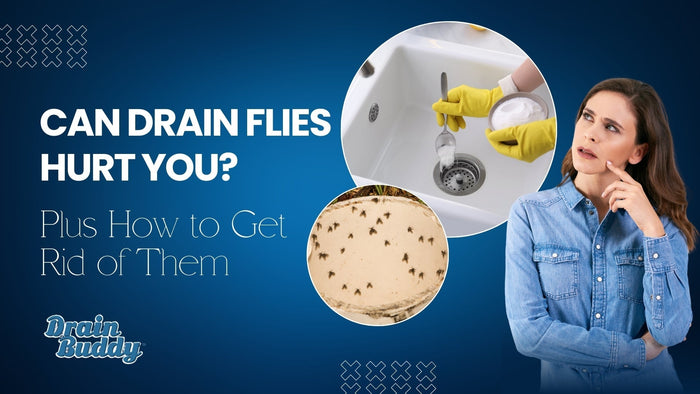
Can Drain Flies Harm You? Plus How To Get Rid Of Them
Summary Points
-
Drain flies don’t bite or sting, but they thrive in dirty drains, carrying bacteria and increasing hygiene concerns.
-
Drain worms feed on organic sludge inside pipes, signaling poor drain maintenance and potential plumbing issues.
-
Enzymatic drain cleaners, boiling water treatments, and regular cleaning can eliminate drain flies and prevent infestations.
-
The Drain Buddy Ultra Flo eliminates frequent clogging and keeps drains free from fly infestations.
Drain flies are a common household nuisance, often appearing near sinks, showers, and drains. While these tiny insects may seem harmless, many homeowners wonder, Are drain flies harmful? Or whether their presence indicates a deeper issue, such as drain worms or bacteria buildup.
This article explores whether drain flies pose any health risks and provides a comprehensive guide on how to get rid of drain worms and flies effectively.

What Are Drain Flies?
Drain flies, also known as sewer flies or moth flies, are small insects measuring between 1.5 to 5 mm. They have fuzzy, moth-like wings, giving them a distinctive appearance. Their color varies from pale gray to black, and they are commonly found in damp environments with organic matter.
These pests thrive in moist, decaying organic material, making drains, septic tanks, and standing water ideal breeding grounds. Unlike other household flies, drain flies do not fly long distances but make short, hopping movements.
Are Drain Flies Harmful?
Drain flies, while not directly harmful, can pose hygiene issues and signal potential health risks due to the organic material they thrive on. Understanding these risks can help you take the necessary precautions to keep your drains clean and free of these pests.
1. Can Drain Flies Carry Diseases?
Drain flies themselves do not transmit diseases to humans or pets. However, their larvae, often referred to as drain worms, feed on decomposing organic material, which can harbor harmful bacteria, fungi, and pathogens. According to a National Center for Biotechnology Information study, flies can transfer over 100 different types of bacteria, increasing the risk of indirect contamination.
2. Do Drain Flies Cause Allergic Reactions?
Dead drain flies and their decomposing bodies can become airborne particles, potentially causing allergic reactions in sensitive individuals. Those with asthma or respiratory conditions may experience irritation from exposure to decaying insect matter.
3. Are Drain Worms Dangerous?
Drain worms thrive in slimy organic residue inside drains. While not inherently dangerous, their presence suggests a buildup of bacteria and unsanitary conditions. If left untreated, they can multiply rapidly, leading to an infestation.
How to Get Rid of Drain Flies and Drain Worms
The first step in eliminating drain flies is identifying their breeding ground. They are commonly found in stagnant water sources such as bathroom and kitchen sinks, floor drains, bathtubs, and septic tanks. Once the source is identified, deep cleaning and sanitation are necessary to remove drain worms and prevent future infestations.
One of the simplest methods to clear drain worms is by pouring boiling water down the drain at least twice daily for a week. This helps kill existing larvae and disrupts the breeding cycle.
Another natural remedy involves a baking soda and vinegar treatment, where ½ cup of baking soda is mixed with ½ cup of salt and poured down the drain, followed by 1 cup of vinegar. Letting this solution sit overnight before flushing with hot water in the morning helps break down organic residue and eliminates drain fly eggs.
For a more effective and long-term solution,bio-enzymatic drain cleaners are recommended. These cleaners contain natural enzymes that break down organic matter inside drains, eliminating the breeding environment for drain flies. Unlike chemical-based drain cleaners, enzymatic solutions are safe for pipes, eco-friendly, and prevent drain buildup without damaging plumbing systems.

A Better Alternative: Drain Buddy
To proactively prevent drain fly infestations and maintain clean drains, consider utilizing specialized products designed to keep drains free from debris and organic buildup.
-
Drain Buddy Ultra Flo for Sinks: This 2-in-1 sink drain stopper and hair catcher effectively traps hair, jewelry, and other debris, preventing clogs and reducing the organic matter that attracts drain flies. Its no-installation design makes it user-friendly and efficient.
-
Drain Buddy Ultra Flo for Bathtubs: Specifically designed for bathtubs, this product functions as both a stopper and a hair catcher, ensuring that larger debris doesn't accumulate in your drains, thereby minimizing potential breeding grounds for drain flies.
By incorporating these products into a regular home maintenance routine, homeowners can significantly reduce the risk of drain fly infestations and maintain a cleaner, more hygienic environment.
Conclusion:
While drain flies are not directly harmful, their presence indicates potential hygiene issues. Drain worms and organic buildup can attract bacteria, increasing health risks over time. By regularly cleaning drains and utilizing preventative products like Drain Buddy in households can prevent drain fly infestations and ensure a cleaner, healthier environment.














